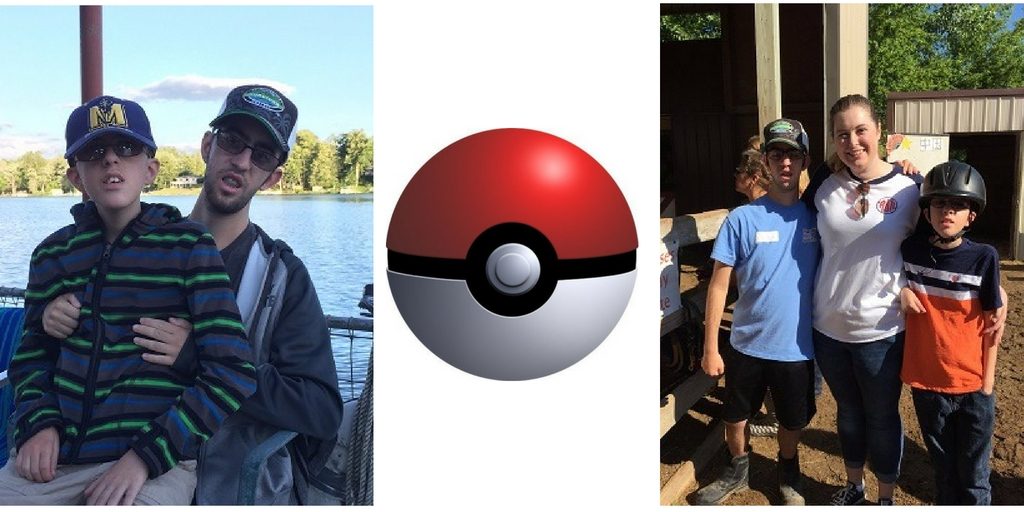Pokémon Go Helps Brothers with Autism Connect with Their Community
by Sydney

Left Photo: Justin (left) and Ryan (right). Middle Photo: Infamous Pokemon ball. Right Photo: Ryan (left) and Justin (right).
At the beginning of July, you may have noticed an unusual number of people navigating through neighborhoods with their phones held high, laser-focused on their screens, cheering “Gotcha!” and making flocks of pigeons everywhere flee in a panic. It’s all because of Pokémon Go, a free augmented reality game where players use their phones to search for and catch Pokémon all over the world.
Recently, the game has garnered a lot of attention in the media, both positive and negative. One of the positive aspects of the game – and an aspect that especially excites us – is the way people with autism spectrum disorder and other disabilities are connecting with the game.
Theresa Forthofer, President and Chief Executive Officer of Easter Seals DuPage & Fox Valley, and mom of three to Ryan, Emily and Justin, has seen this connection firsthand. Her two sons, Ryan (23) and Justin (16), both have autism spectrum disorder and myotonic muscular dystrophy (MMD). Typically, they enjoy playing video games with each other and hanging out indoors, but since downloading Pokémon Go, Theresa noticed that the boys enjoy heading outdoors and are making friends in the neighborhood.
Ryan first downloaded the app onto his iPhone after hearing about it from his personal support worker and shared the game with Justin. Later, when their grandfather announced that he would be taking the dog for a walk, Justin and Ryan were eager to join him, hoping to find those elusive Pokémon on the one-mile trek to the park. Theresa called this change in the boys’ routine and behavior nothing short of “miraculous”.
Easter Seals DuPage & Fox Valley Occupational Therapist, Brittany Diasio, finds the game is helping children and adults with important judgement and spatial awareness skills too. “Being aware of the space around you, while interacting within the app to navigate new areas, are great skills for all to work on. It takes judgement to know when to cross the street at the right time and the spatial awareness to understand your relationship with objects around you, including Pokémon.”
Soon after their first trek with the game, Ryan and Justin joined about a dozen kids in their
neighborhood on a collective hunt for Pokémon. They spent two hours roaming through backyards in the hot summer sun playing and chatting about their recent captures.
“For them to be part of something fun like that was pretty unique,” Theresa said. “It’s exciting and inspiring because it’s an opportunity to show our neighbors that Ryan and Justin like a lot of the same things they do, but they may not be able to do everything in the same way.”
The first week was literally game-changing for Ryan and Justin as they began to interact with the people
around them, and Theresa and her husband encouraged their sons to go out and “catch em’ all”, downloading the game themselves. The family fun has continued since then, with the game playing a key role in the boys’ interaction on a recent family camping trip.
“[Pokémon Go] gives them an ability to relate to their peers and everyone around them in a really fun, natural way,” Theresa said. “It’s easy to accept differences when you have something in common. Pokémon brings that common element into play.”






